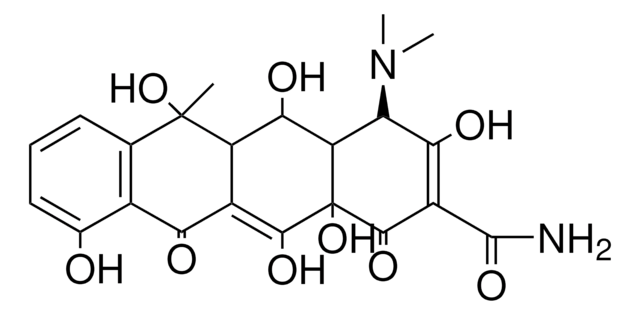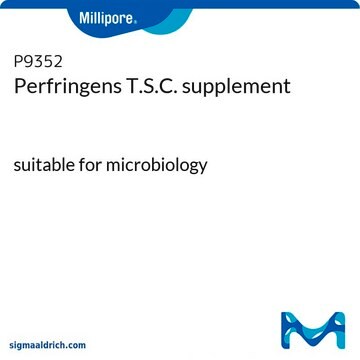51239
Oxytetra Selective Supplement
suitable for microbiology
Synonym(s):
Oxytetracycline, OGYE Selective Supplement
About This Item
Recommended Products
sterility
sterile
Quality Level
form
powder
shelf life
limited shelf life, expiry date on the label
antibiotic activity spectrum
Gram-negative bacteria
Gram-positive bacteria
application(s)
environmental
food and beverages
pharmaceutical
microbiology
Mode of action
protein synthesis | interferes
suitability
molds
yeasts
SMILES string
CN(C)[C@H]1[C@@H]2[C@@H](O)[C@H]3C(=C(O)[C@]2(O)C(=O)C(C(N)=O)=C1O)C(=O)c4c(O)cccc4[C@@]3(C)O
InChI
1S/C22H24N2O9/c1-21(32)7-5-4-6-8(25)9(7)15(26)10-12(21)17(28)13-14(24(2)3)16(27)11(20(23)31)19(30)22(13,33)18(10)29/h4-6,12-14,17,25,27-29,32-33H,1-3H3,(H2,23,31)/t12-,13-,14+,17+,21-,22+/m1/s1
InChI key
IWVCMVBTMGNXQD-PXOLEDIWSA-N
Looking for similar products? Visit Product Comparison Guide
General description
Application
Biochem/physiol Actions
Features and Benefits
Components
Oxytetracycline 50.0 mg
related product
Signal Word
Warning
Hazard Statements
Precautionary Statements
Hazard Classifications
Aquatic Chronic 2 - Repr. 2
Storage Class Code
11 - Combustible Solids
WGK
WGK 2
Flash Point(F)
Not applicable
Flash Point(C)
Not applicable
Personal Protective Equipment
Choose from one of the most recent versions:
Already Own This Product?
Find documentation for the products that you have recently purchased in the Document Library.
Customers Also Viewed
Our team of scientists has experience in all areas of research including Life Science, Material Science, Chemical Synthesis, Chromatography, Analytical and many others.
Contact Technical Service










